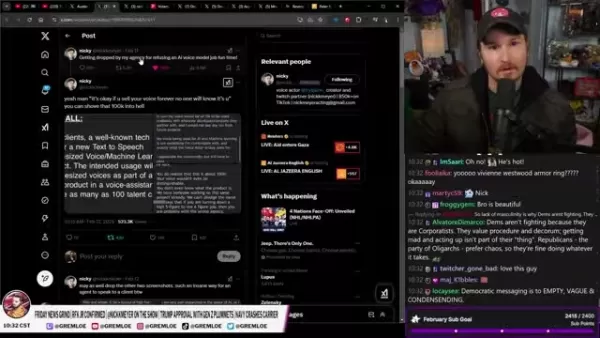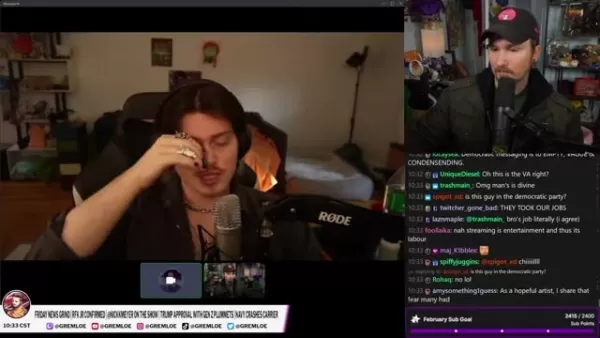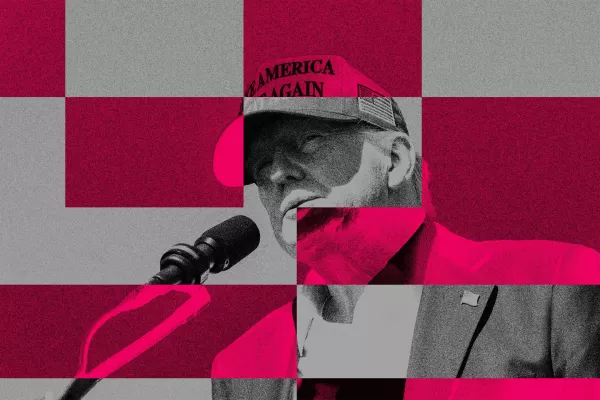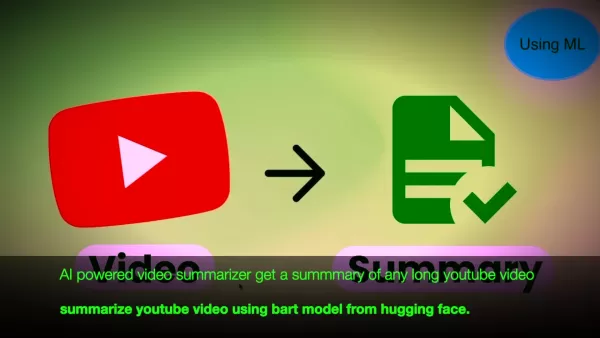AI Voice Model Jobs: Safeguarding Your Vocal Persona as a Voice Actor
AI Voice Models & the Ethical Battle for Voice Actors’ Rights
The rapid advancement of AI voice technology is reshaping the entertainment industry—but at what cost? While AI-generated voices open new creative possibilities, they also raise urgent ethical questions about consent, fair compensation, and the future of human artistry.
For voice actors, this isn’t just about job security—it’s about protecting their identity.
The AI Voice Dilemma: Opportunity or Exploitation?
AI voice modeling presents a double-edged sword for voice actors:
✅ New Revenue Streams – Licensing voices for AI can provide steady income.
❌ Loss of Control – Once a voice is digitized, who decides how it’s used?
❌ Devaluation of Human Talent – If AI can mimic voices cheaply, will studios still hire actors?
The Case of Nick Meyer: A Warning for Voice Actors
Actor Nick Meyer made headlines when his agency dropped him for refusing AI voice work. Surprisingly, this led to more interest from ethical agencies who valued his stance. His story highlights a critical issue:
Should voice actors have to surrender their vocal identity to stay relevant?

Is AI Replacing Human Voice Actors?
Proponents argue AI increases efficiency, but at what cost?
- Job Displacement – Studios may prefer AI over hiring actors.
- Artistic Dilution – AI lacks the emotional depth of human performance.
- Ethical Grey Areas – Who owns a replicated voice?
Key Question: Should AI augment human talent—or replace it?

How Voice Actors Can Protect Themselves
1. Understand Your Contracts
- AI Clauses – Does the contract allow indefinite use of your voice?
- Compensation – Demand residuals, not just one-time payments.
- Usage Rights – Limit where and how your voice can be replicated.
2. Seek Legal & Union Support
- SAG-AFTRA – Advocates for fair AI usage in entertainment.
- NAVA (National Association of Voice Actors) – Offers resources on digital rights.
- Legal Counsel – Specialized lawyers can negotiate protective clauses.
3. Build Your Unique Value
AI struggles with authentic emotion, improvisation, and nuance. The more distinctive your style, the harder you are to replace.
Pricing Your Digital Likeness: What’s Fair?
If you license your voice for AI, consider:
✔ Royalties – Ongoing payments per usage.
✔ Residuals – Earnings from long-term projects.
✔ Approval Rights – Control over how your voice is used.
The Future: Will AI Dominate Voice Acting?
Pros of AI in Voice Work
- Accessibility – Helps creators who lack budgets for human actors.
- Efficiency – Speeds up production for minor roles.
Cons of AI in Voice Work
- Homogenization – AI voices may lack diversity and originality.
- Exploitation – Without unions, actors have little bargaining power.
- Ethical Risks – Unauthorized voice cloning is already happening.
FAQs: Protecting Your Voice in the AI Era
Do I need an agent to start voice acting?
No, but agents help secure higher-profile work.
What if my agency drops me for refusing AI work?
Seek agencies that respect your boundaries—many exist.
Can I trademark my voice?
Yes. The USPTO allows sound marks, including unique vocal signatures.
How do I stop unauthorized AI voice cloning?
- Monitor usage.
- Legal action if your voice is replicated without consent.
Final Thoughts: The Human Voice Still Matters
AI won’t disappear—but neither should human artistry. The key is ethical AI use: augmentation, not replacement.
Voice actors must:
🔹 Demand fair contracts
🔹 Unionize for protection
🔹 Embrace what makes them irreplaceable
The battle isn’t against technology—it’s for respect, rights, and recognition in an evolving industry.
Related article
 AI-Powered Cover Letters: Expert Guide for Journal Submissions
In today's competitive academic publishing environment, crafting an effective cover letter can make the crucial difference in your manuscript's acceptance. Discover how AI-powered tools like ChatGPT can streamline this essential task, helping you cre
AI-Powered Cover Letters: Expert Guide for Journal Submissions
In today's competitive academic publishing environment, crafting an effective cover letter can make the crucial difference in your manuscript's acceptance. Discover how AI-powered tools like ChatGPT can streamline this essential task, helping you cre
 US to Sanction Foreign Officials Over Social Media Regulations
US Takes Stand Against Global Digital Content Regulations
The State Department issued a sharp diplomatic rebuke this week targeting European digital governance policies, signaling escalating tensions over control of online platforms. Secretary Marco
US to Sanction Foreign Officials Over Social Media Regulations
US Takes Stand Against Global Digital Content Regulations
The State Department issued a sharp diplomatic rebuke this week targeting European digital governance policies, signaling escalating tensions over control of online platforms. Secretary Marco
 Ultimate Guide to AI-Powered YouTube Video Summarizers
In our information-rich digital landscape, AI-powered YouTube video summarizers have become indispensable for efficient content consumption. This in-depth guide explores how to build a sophisticated summarization tool using cutting-edge NLP technolog
Comments (7)
0/200
Ultimate Guide to AI-Powered YouTube Video Summarizers
In our information-rich digital landscape, AI-powered YouTube video summarizers have become indispensable for efficient content consumption. This in-depth guide explores how to build a sophisticated summarization tool using cutting-edge NLP technolog
Comments (7)
0/200
![JuanLopez]() JuanLopez
JuanLopez
 August 23, 2025 at 7:01:21 PM EDT
August 23, 2025 at 7:01:21 PM EDT
AI voice tech is wild! It’s cool for creativity, but I’m worried about actors losing control over their voices. Ethics need to catch up fast! 😬


 0
0
![NoahSmith]() NoahSmith
NoahSmith
 July 31, 2025 at 10:48:18 PM EDT
July 31, 2025 at 10:48:18 PM EDT
This article really opened my eyes to the ethical mess AI voice tech is stirring up! 😮 As a voice actor, it’s wild to think my voice could be cloned without my okay. The industry needs to step up and protect artists’ rights before this gets out of hand.


 0
0
![DonaldSanchez]() DonaldSanchez
DonaldSanchez
 June 28, 2025 at 4:49:29 PM EDT
June 28, 2025 at 4:49:29 PM EDT
AI 음성 기술이 대박이네! 근데 성우들 목소리 도용당할까 걱정돼 😟. 공정한 보상과 동의, 꼭 필요하다고 생각해!


 0
0
![CharlesNelson]() CharlesNelson
CharlesNelson
 June 28, 2025 at 1:17:15 PM EDT
June 28, 2025 at 1:17:15 PM EDT
Wow, this AI voice tech is wild! 😮 It's cool how it opens new creative doors, but I’m worried about actors losing control over their voices. Ethics need to catch up fast!


 0
0
![JeffreyThomas]() JeffreyThomas
JeffreyThomas
 June 28, 2025 at 8:44:14 AM EDT
June 28, 2025 at 8:44:14 AM EDT
¡La tecnología de voz con IA es una locura! Abre tantas posibilidades, pero ¿y los derechos de los actores? Espero que se regule bien. 🎙️


 0
0
![TerryAdams]() TerryAdams
TerryAdams
 June 28, 2025 at 5:55:19 AM EDT
June 28, 2025 at 5:55:19 AM EDT
L’IA pour les voix, c’est impressionnant, mais flippant aussi. Les acteurs méritent d’être protégés, non ? Faut des lois claires, vite ! 😕


 0
0
AI Voice Models & the Ethical Battle for Voice Actors’ Rights
The rapid advancement of AI voice technology is reshaping the entertainment industry—but at what cost? While AI-generated voices open new creative possibilities, they also raise urgent ethical questions about consent, fair compensation, and the future of human artistry.
For voice actors, this isn’t just about job security—it’s about protecting their identity.
The AI Voice Dilemma: Opportunity or Exploitation?
AI voice modeling presents a double-edged sword for voice actors:
✅ New Revenue Streams – Licensing voices for AI can provide steady income.
❌ Loss of Control – Once a voice is digitized, who decides how it’s used?
❌ Devaluation of Human Talent – If AI can mimic voices cheaply, will studios still hire actors?
The Case of Nick Meyer: A Warning for Voice Actors
Actor Nick Meyer made headlines when his agency dropped him for refusing AI voice work. Surprisingly, this led to more interest from ethical agencies who valued his stance. His story highlights a critical issue:
Should voice actors have to surrender their vocal identity to stay relevant?

Is AI Replacing Human Voice Actors?
Proponents argue AI increases efficiency, but at what cost?
- Job Displacement – Studios may prefer AI over hiring actors.
- Artistic Dilution – AI lacks the emotional depth of human performance.
- Ethical Grey Areas – Who owns a replicated voice?
Key Question: Should AI augment human talent—or replace it?

How Voice Actors Can Protect Themselves
1. Understand Your Contracts
- AI Clauses – Does the contract allow indefinite use of your voice?
- Compensation – Demand residuals, not just one-time payments.
- Usage Rights – Limit where and how your voice can be replicated.
2. Seek Legal & Union Support
- SAG-AFTRA – Advocates for fair AI usage in entertainment.
- NAVA (National Association of Voice Actors) – Offers resources on digital rights.
- Legal Counsel – Specialized lawyers can negotiate protective clauses.
3. Build Your Unique Value
AI struggles with authentic emotion, improvisation, and nuance. The more distinctive your style, the harder you are to replace.
Pricing Your Digital Likeness: What’s Fair?
If you license your voice for AI, consider:
✔ Royalties – Ongoing payments per usage.
✔ Residuals – Earnings from long-term projects.
✔ Approval Rights – Control over how your voice is used.
The Future: Will AI Dominate Voice Acting?
Pros of AI in Voice Work
- Accessibility – Helps creators who lack budgets for human actors.
- Efficiency – Speeds up production for minor roles.
Cons of AI in Voice Work
- Homogenization – AI voices may lack diversity and originality.
- Exploitation – Without unions, actors have little bargaining power.
- Ethical Risks – Unauthorized voice cloning is already happening.
FAQs: Protecting Your Voice in the AI Era
Do I need an agent to start voice acting?
No, but agents help secure higher-profile work.
What if my agency drops me for refusing AI work?
Seek agencies that respect your boundaries—many exist.
Can I trademark my voice?
Yes. The USPTO allows sound marks, including unique vocal signatures.
How do I stop unauthorized AI voice cloning?
- Monitor usage.
- Legal action if your voice is replicated without consent.
Final Thoughts: The Human Voice Still Matters
AI won’t disappear—but neither should human artistry. The key is ethical AI use: augmentation, not replacement.
Voice actors must:
🔹 Demand fair contracts
🔹 Unionize for protection
🔹 Embrace what makes them irreplaceable
The battle isn’t against technology—it’s for respect, rights, and recognition in an evolving industry.
 AI-Powered Cover Letters: Expert Guide for Journal Submissions
In today's competitive academic publishing environment, crafting an effective cover letter can make the crucial difference in your manuscript's acceptance. Discover how AI-powered tools like ChatGPT can streamline this essential task, helping you cre
AI-Powered Cover Letters: Expert Guide for Journal Submissions
In today's competitive academic publishing environment, crafting an effective cover letter can make the crucial difference in your manuscript's acceptance. Discover how AI-powered tools like ChatGPT can streamline this essential task, helping you cre
 US to Sanction Foreign Officials Over Social Media Regulations
US Takes Stand Against Global Digital Content Regulations
The State Department issued a sharp diplomatic rebuke this week targeting European digital governance policies, signaling escalating tensions over control of online platforms. Secretary Marco
US to Sanction Foreign Officials Over Social Media Regulations
US Takes Stand Against Global Digital Content Regulations
The State Department issued a sharp diplomatic rebuke this week targeting European digital governance policies, signaling escalating tensions over control of online platforms. Secretary Marco
 Ultimate Guide to AI-Powered YouTube Video Summarizers
In our information-rich digital landscape, AI-powered YouTube video summarizers have become indispensable for efficient content consumption. This in-depth guide explores how to build a sophisticated summarization tool using cutting-edge NLP technolog
Ultimate Guide to AI-Powered YouTube Video Summarizers
In our information-rich digital landscape, AI-powered YouTube video summarizers have become indispensable for efficient content consumption. This in-depth guide explores how to build a sophisticated summarization tool using cutting-edge NLP technolog
 August 23, 2025 at 7:01:21 PM EDT
August 23, 2025 at 7:01:21 PM EDT
AI voice tech is wild! It’s cool for creativity, but I’m worried about actors losing control over their voices. Ethics need to catch up fast! 😬


 0
0
 July 31, 2025 at 10:48:18 PM EDT
July 31, 2025 at 10:48:18 PM EDT
This article really opened my eyes to the ethical mess AI voice tech is stirring up! 😮 As a voice actor, it’s wild to think my voice could be cloned without my okay. The industry needs to step up and protect artists’ rights before this gets out of hand.


 0
0
 June 28, 2025 at 4:49:29 PM EDT
June 28, 2025 at 4:49:29 PM EDT
AI 음성 기술이 대박이네! 근데 성우들 목소리 도용당할까 걱정돼 😟. 공정한 보상과 동의, 꼭 필요하다고 생각해!


 0
0
 June 28, 2025 at 1:17:15 PM EDT
June 28, 2025 at 1:17:15 PM EDT
Wow, this AI voice tech is wild! 😮 It's cool how it opens new creative doors, but I’m worried about actors losing control over their voices. Ethics need to catch up fast!


 0
0
 June 28, 2025 at 8:44:14 AM EDT
June 28, 2025 at 8:44:14 AM EDT
¡La tecnología de voz con IA es una locura! Abre tantas posibilidades, pero ¿y los derechos de los actores? Espero que se regule bien. 🎙️


 0
0
 June 28, 2025 at 5:55:19 AM EDT
June 28, 2025 at 5:55:19 AM EDT
L’IA pour les voix, c’est impressionnant, mais flippant aussi. Les acteurs méritent d’être protégés, non ? Faut des lois claires, vite ! 😕


 0
0





























